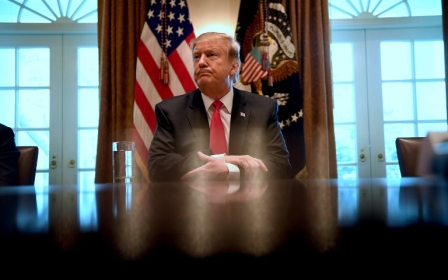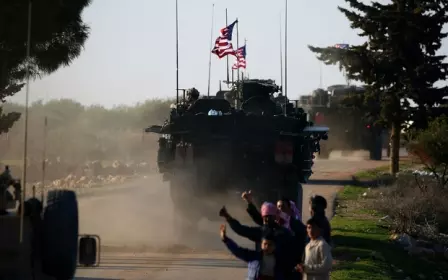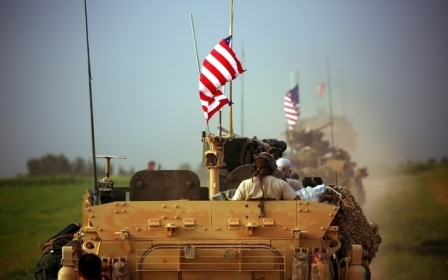Trump defends US pullout of Syria in his State of the Union address

It took more than 60 minutes for Donald Trump to mention the Middle East in his State of the Union speech, but when he did, the US president defended his decision to pull American troops out of Syria, despite opposition among the nation’s top military and intelligence brass and from the president’s own political party.
The State of the Union is a yearly presidential address where the US leader touts his accomplishments and outlines his vision for the future of the country.
"When I took office, ISIS controlled more than 20,000 square miles in Iraq and Syria. Today, we have liberated virtually all of that territory from the grip of these bloodthirsty monsters," the president said on Tuesday night, using a different acronym for the Islamic State (IS) group.
"As we work with our allies to destroy the remnants of ISIS, it is time to give our brave warriors in Syria a warm welcome home," he added.
The White House said in mid-December that it had already started withdrawing troops as the battle against IS was winding down.
The US has at least 2,000 troops stationed in Syria, where it has also waged an aerial campaign in support of the Kurdish-led Syrian Democratic Forces (SDF) in the fight against IS.
Trump said the U.S. have virtually liberated all of the ISIS-controlled land in Iraq and Syria. True, but experts – including in the U.S. military -- say the group still has tens of thousands of fighters and remains dangerous. https://t.co/Pa3nERbNRK
— FactCheck.org (@factcheckdotorg) February 6, 2019
However, military generals, intelligence chiefs and members of the president’s Republican Party warned against an IS resurgence in the war-torn country.
"We do have to keep pressure on this network.... They have the ability of coming back together if we don't," General Joseph Votel, head of the US military's Central Command, told a Senate Armed Services Committee hearing hours before the president’s public address.
In his comments to the committee, Votel said the president did not consult him on the Syria withdrawal.
Also on Tuesday, the US Senate passed a major piece of Middle East legislation that includes a non-binding yet symbolic amendment that openly opposes any abrupt withdrawal of US troops from Syria and Afghanistan.
The bill, which nearly every Republican voted in favour of, warned that "a precipitous withdrawal" in Syria has the potential to create a vacuum that could be filled by Iran or Russia.
On Monday, the Pentagon's own internal watchdog released a report saying IS remained active in both Iraq and Syria but was regenerating its functions and capabilities more quickly in the former.
And last week, US intelligence chiefs also broke with the president, saying IS would continue to pursue attacks from Syria, as well as Iraq, against regional and Western adversaries, including the US.
Israel and Iran
On Israel, Trump reiterated his administration's decision to move the US embassy to Jerusalem, which drew international condemnation.
"Our approach is based on principled realism - not discredited theories that have failed for decades to yield progress. For this reason, my administration recognised the true capital of Israel - and proudly opened the American Embassy in Jerusalem," Trump said.
Regarding Iran, the president called the Islamic Republic "the world's leading state sponsor of terror," adding that the country does "bad, bad things".
He also took another swipe at the 2015 Iran nuclear deal.
"To ensure this corrupt dictatorship never acquires nuclear weapons, I withdrew the United States from the disastrous Iran nuclear deal. And last fall, we put in place the toughest sanctions ever imposed on a country," Trump said.
When the US pulled out of the multilateral nuclear accord, Trump's administration touted that sanctions would put pressure on Iran to curb its missile programme and regional activities.
However, a senior US government researcher on Iran said sanctions have done little to limit Iran's support for armed groups in the Middle East.
State of the Union guests
Individuals from the Middle East also featured prominently as guests of elected officials.
Every member of Congress – both the Senate and House of Representatives – is allowed to invite someone to accompany him or her to the president’s annual speech.
The guests included Nobel Peace Prize winner Nadia Murad, an Iraqi Yazidi woman who escaped the clutches of IS to become a leading campaigner against sexual violence in war.
Murad was invited by Jeff Fortenberry, a Republican congressman for Nebraska, who said the 26-year-old's tale "is a story the world needs to hear".
IS fighters swept into Murad's village, Kojo, in August 2014, killing the men, taking children captive to train them as fighters and condemning thousands of women to a life of forced labour and sexual slavery.
Murad was taken to Mosul, the Iraqi "capital" of IS's self-declared caliphate. She was held captive there and repeatedly gang-raped, tortured and beaten.
IS fighters wanted "to take our honour, but they lost their honour", she has previously said about the ordeal.
Another guest was pastor Andrew Brunson, who was freed from a Turkish jail after spending a year and a half there and becoming a cause celebre for Trump's conservative Christian base.
Republican Senator Thom Tillis invited the pastor to watch Trump’s address.
Middle East Eye propose une couverture et une analyse indépendantes et incomparables du Moyen-Orient, de l’Afrique du Nord et d’autres régions du monde. Pour en savoir plus sur la reprise de ce contenu et les frais qui s’appliquent, veuillez remplir ce formulaire [en anglais]. Pour en savoir plus sur MEE, cliquez ici [en anglais].




